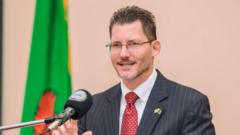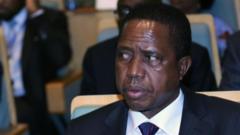The US has suspended $50 million in health aid to Zambia due to the country's ongoing issues with the theft of vital medical supplies, impacting many vulnerable citizens.
US Halts $50 Million Health Aid to Zambia Amid Medicine Theft Crisis

US Halts $50 Million Health Aid to Zambia Amid Medicine Theft Crisis
The US government trims financial support to Zambia in response to rampant drug theft and corruption.
In a significant move, the United States announced the cessation of $50 million in aid designated for Zambia's health sector, citing continuous "systematic theft" of donated medicines and medical supplies as the primary reason. US Ambassador to Zambia, Michael Gonzales, described the decision as "difficult" yet essential, emphasizing that continued funding could not be justified in light of the rampant misuse of resources intended for the country's most vulnerable populations. The Zambian government has yet to respond to this development.
The aid reduction comes amid a concerning backdrop of previously reported misappropriations involving high-ranking health officials in Zambia. US officials indicated that a recent investigation uncovered widespread criminal action, with over 2,000 pharmacies found selling medications that should have been distributed freely to the public. Astonishingly, 95% of the examined pharmacies were involved in this illicit activity, selling both donated drugs and those misappropriated from various sources, including Zambian government stocks.
In April of the previous year, the US embassy presented its findings to Zambian authorities, alongside offers for assistance in tackling this ongoing crisis. However, little progress has been made, with law enforcement largely targeting low-level offenders rather than addressing the root causes or those orchestrating the thefts. The US embassy expressed frustration over the government's inadequate response, stressing a need for a renewed commitment to safeguarding aid.
Ambassador Gonzales reiterated that the cuts would have severe repercussions for patients needing treatment for malaria, HIV, and tuberculosis, shedding tears as he conveyed the gravity of the situation. The aid suspension is set to take effect in January of the following year, allowing the Zambian government time to seek alternatives.
This development aligns with broader patterns seen since the Trump administration's foreign policy shift, which emphasized cuts to global health initiatives, disproportionately affecting countries like Zambia, where wars against diseases such as HIV continue. The situation has prompted Zambia's President, Hakainde Hichilema, to call for self-reliance in health procurement, indicating a push towards strengthening local resources in light of external challenges.




















